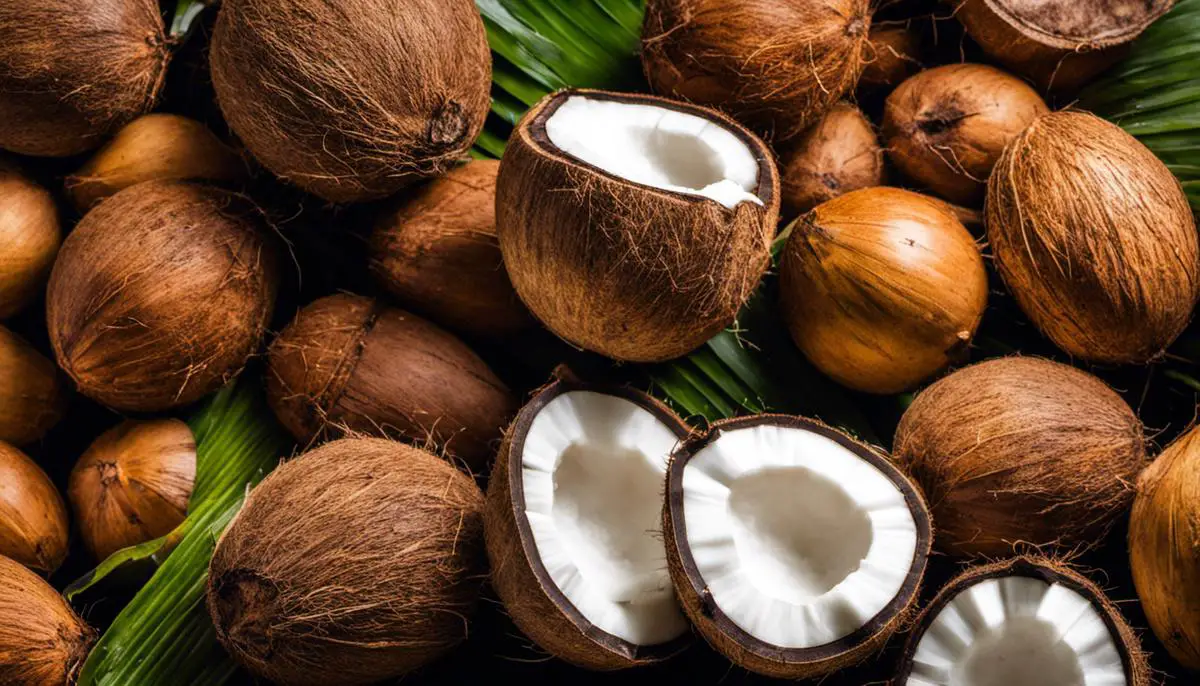Table of Contents
Coconuts are more than just a tropical staple; they’re a multipurpose marvel of nature with a plethora of health benefits. Developed countries have embraced coconuts, not just as a delicious flavor enhancer but as a vital addition to a balanced diet. Proven to be an outstanding source of essential vitamins, minerals, fiber, and beneficial fats, coconuts play a role in overcoming many health challenges. They have a promising influence on heart health, mental function, digestion, immune system, and skin health. However, like any other food, coconut consumption needs to be balanced and mindful for it to be truly beneficial.
Nutritional Value of Coconuts
Nutritional Profile of Coconuts
Coconuts are already well-known for their delicious flavor and versatile culinary applications, but they also boast a substantial nutritional profile. They are notably high in several key nutrients that can significantly contribute to overall health and wellness as part of a balanced diet.
One of the primary nutrients found in coconuts is manganese. This essential mineral supports enzyme function and fat metabolism, and it aids in bone health. A single cup of coconut meat could provide over half of the recommended daily intake of manganese. In addition to their high manganese content, coconuts are also a good source of copper and iron, which aid in forming red blood cells, as well as selenium, an important antioxidant that helps to protect cells from damage.
Vitamins found in coconuts are also worth mentioning. Coconuts are rich in B vitamins such as B1, B3, B5, and B6. These vitamins are critical for turning food into energy in the body. They also offer a decent amount of vitamin C, which is a potent antioxidant and integral for the health of skin, tendons, ligaments and blood vessels.
Fiber and Beneficial Fats in Coconuts
Coconuts are high in fiber, with a single cup delivering as much as 7.2 grams. This type of dietary fiber aids in digestion by adding bulk to the stool, which can help prevent constipation and promote regular bowel movements. Furthermore, fiber can help control weight by making one feel fuller faster and longer. Its beneficial effect is also seen in controlling blood sugar level by slowing the absorption of sugar into the bloodstream.
Moreover, coconuts are packed with medium-chain triglycerides (MCTs), a type of fat that may aid in weight loss, improve brain and heart health, and boost energy levels. MCTs are directly absorbed into the liver where they are converted into ketones, substances produced when the liver breaks down a lot of fat, and used as a quick source of energy.
The emphasis on the nutritional benefits of coconuts should not overshadow the caution that coconuts are also high in calories and saturated fat. While MCTs are beneficial, excessive intake of the high-calorie and high-fat content can lead to weight gain and increased risk in heart disease. It is important to enjoy coconuts as part of a balanced and varied diet.
Hydration and Electrolytes
Additionally, coconut water is a natural source of electrolytes, with high levels of potassium, magnesium, sodium, and calcium. It is a healthy hydrating choice for replenishing lost electrolytes after physical activities or during illnesses like flu or gastroenteritis. Its high potassium content is noteworthy as it helps maintain a healthy heart rhythm and keeps muscles functioning well.
Coconuts are a versatile and cherished fruit found in many cultures, known not just for their refreshing taste but also for the wealth of nutrients they provide. Containing a range of vitamins, minerals, fiber, and beneficial fats, they can significantly contribute to our overall health and wellness, especially when incorporated into a balanced diet. That being said, it’s important to note that due to their high calorie and fat content, moderation is key when consuming them.

Coconut and Heart Health
The Impact of Coconuts on Heart Health
However, there is a lot more to coconuts than just their flavour and nutritional value. They are gaining considerable attention for their potential health benefits, particularly in relation to heart health.
One distinct trait of coconuts is their high concentration of medium-chain triglycerides (MCTs). This sets them apart from most other fat sources that are rich in long-chain triglycerides. The structure and metabolic pathway of MCTs stand them in good stead as a healthier option; they are quickly absorbed by the liver and are either converted into quick energy or turned into ketones, unlike other fats that could get stored in the body.
Coconut Oil and Cholesterol Levels
There is a persistent association between the notion of fats and high cholesterol. However, the truth is more nuanced. The fats present in coconut oil, mostly saturated fats, are different from those found in most other oils. Understanding their unique structure and impact takes us beyond the common association.
The main fatty acid in coconut oil is lauric acid, which is known to raise total cholesterol levels. However, it appears to boost high-density lipoprotein (HDL), the ‘good’ cholesterol, to a greater extent than low-density lipoprotein (LDL), the ‘bad’ cholesterol. Having a higher level of HDL cholesterol is thought to reduce heart disease risk.
Coconut Consumption and Heart Disease Risk
Studies on populations living in the tropical regions, where coconut forms a dietary staple, provide an insight into coconut consumption and heart disease risk. Populations that consume a large portion of their calories from coconuts seem to be in good health with no evident signs of heart disease.
However, some of these healthy effects could be attributed to other healthy behaviors practiced by these populations such as a plant-based diet, and their generally active lifestyle. Therefore, while correlations can be made, it is still important to recognize the presence of other contributing elements.
Current research suggests a potential link between consuming coconuts and an improvement in heart health. The majority of the evidence, however, is based on observational studies and research focused on Medium Chain Triglycerides (MCT) oil, which doesn’t accurately represent coconut oil due to its different fat composition. Therefore, while these findings are promising, more controlled studies are crucial to clarify the connection between coconut oil and cardiovascular health. As a general rule of thumb, coconut products, like any other food group, should be included in a balanced diet enriched with various nutrient-dense foods to promote overall heart health and well-being.

Other Health Benefits of Coconut
Enhancing Brain Function Through Coconut
Coconut can also contribute to maintaining a healthy brain. This is largely due to the distinctive way our bodies metabolize the Medium Chain Triglycerides (MCTs) found in coconut oil. Instead of undergoing the usual, longer metabolic process, MCTs are directed straight to the liver. Here, they either rapidly supply energy or turn into ketones. Ketones are currently under extensive research for their potential therapeutic impact on brain conditions such as epilepsy and Alzheimer’s disease. Indeed, studies published in the “Current Alzheimer Research” and “Neurobiology of Aging” journals indicate that MCT consumption may notably enhance cognitive performance in Alzheimer’s patients.
Coconut and Digestive Health
Coconut oil may also provide benefits for digestive health by killing harmful microbes in the body. Ingesting coconut oil could help to stave off various bacterial, viral, and fungal infections. The antimicrobial properties of coconut oil can primarily be attributed to its content of lauric acid, which disrupts the lipid membranes of harmful organisms, effectively causing them to die off.
Enhancement of Immune Functions
Coconut is packed with essential nutrients that have antibacterial, antiviral and antifungal properties, making it a superfood for enhancing immunity. The high lauric acid component in coconut oil, which is also found in breast milk, is known to protect the body against a myriad of infections. A study in “Journal of Medicinal Food” found that coconut oil was successful in eliminating chronic Staphylococcus aureus, a bacteria that causes dangerous infections.
Skin Health and Coconut
The application of coconut oil can also do wonders for the skin. Coconut oil is commonly used as a natural moisturizer and it can improve the moisture content of dry skin. It can also reduce symptoms of eczema. In a study in the “International Journal of Dermatology,” eczema patients using coconut oil saw a marked improvement in skin hydration and a decrease in surface bacteria and skin infections. Furthermore, coconut oil has anti-aging properties due to its antioxidant components. It can reduce oxidative damage caused by exposure to the sun and environmental pollutants, thereby minimizing the appearance of wrinkles and age spots over time.
Coconut and Heart Health
Lauric acid was once frowned upon due to its saturated fat content and supposed contribution to heart disease. However, more recent studies have shown that although coconut oil increases “bad” LDL cholesterol, it also raises “good” HDL cholesterol, thereby potentially not posing a threat to heart health. Some controlled studies found that when participants changed their oils to coconut oil, they had reduced belly fat, which contributes to heart diseases. Nonetheless, detailed studies are required to understand the relationship between regular coconut consumption and cardiovascular health.
Weight Loss and Coconut
Aiding in weight loss is another potential health benefit of coconuts. Due to the high fiber content, coconuts can help feel satiated and thereby reduce hunger. Furthermore, the MCTs in coconut oil can increase the number of calories your body burns compared to longer-chain fats. Notably, studies involving rats indicate that the MCT found in coconut oil can lead to reduced body weight and fat storage, suggesting potential weight loss effects for human as well.
Regulation of Blood Sugar Levels
New research suggest that coconut can play a role in regulating blood sugar levels, potentially assisting in the management of diabetes. A study featured in the “Journal of Complementary and Integrative Medicine” showed that mice fed with a coconut-rich diet exhibited improved insulin secretion and better blood glucose control. However, the direct impact on human health and blood sugar control still requires further investigation.

Precautions and Side Effects
Considerations for Consuming Coconut
Despite the multitude of health perks linked to coconut, it’s important to remember that moderation is crucial. The high saturated fat content in coconuts can lead to weight gain or higher cholesterol if consumed in excess. This is particularly significant for individuals with pre-existing heart conditions or high cholesterol, as overconsumption might heighten the risk of cardiovascular diseases.
Furthermore, consuming unripe or improperly stored coconuts and related products could lead to food poisoning. Therefore, it’s crucial to ensure the source, quality, and storage conditions of the coconut products before consumption.
Potential Side Effects and Risks
Apart from the long-term implications such as weight gain or increased cholesterol levels, consuming coconuts and its derivative products in excessive quantities may lead to digestive issues such as diarrhea or stomach cramps. Coconut milk and raw coconuts are culprits in this regard, given their high oils and fiber content.
Moreover, the medium chain triglycerides (MCTs) present in coconut oil can cause nausea, vomiting, and diarrhea if taken in large amounts. Besides, certain people might also experience discomfort while metabolizing these fats.
Furthermore, due to the high potassium content of coconuts, individuals with kidney ailments must limit their consumption – excessive potassium can prove detrimental for functioning kidneys.
Potential Allergic Reactions
Allergies to coconuts are relatively rare but could still occur in sensitive individuals. Symptoms of a coconut allergy are typical of food allergies and may include nausea, diarrhea, skin rashes, hives, breathing difficulties, and anaphylaxis in severe cases. Therefore, individuals with known food allergies should exercise caution when trying coconut for the first time.
Interestingly, while coconuts are part of the palm family, they are not classified as tree nuts. Therefore, people with a tree nut allergy are not more likely to be allergic to coconuts. However, some individuals with a tree nut allergy indeed have an allergic response to coconuts – again, caution must be exercised.
To sum up
While the health benefits of coconut are manifold, potential risks and precautions need due consideration. As with any food, moderation is key and consulting with healthcare professionals before incorporating new elements, like coconut, into the diet is always advisable, especially for individuals with known medical conditions.

While the fruits of the coconut palm provide a cornucopia of health benefits, these are hinged on moderate consumption and can be offset by excess intake or potential allergies. To maximize the benefits of coconuts, they should be consumed as part of a balanced diet, consisting of a variety of other nutrient-dense foods. As we’ve discussed, the nutritional profile of coconuts can contribute positively to heart health, mental clarity, digestive wellness, and immune function while promoting overall skin health. However, always consult with your healthcare provider or a dietitian to understand how best to incorporate coconuts into your diet, considering your health status, lifestyle, and individual nutritional needs.

